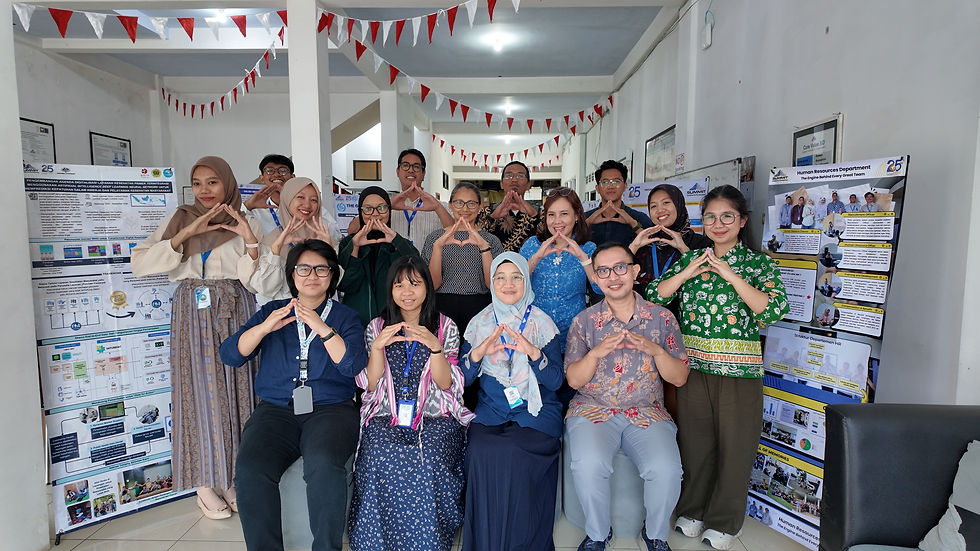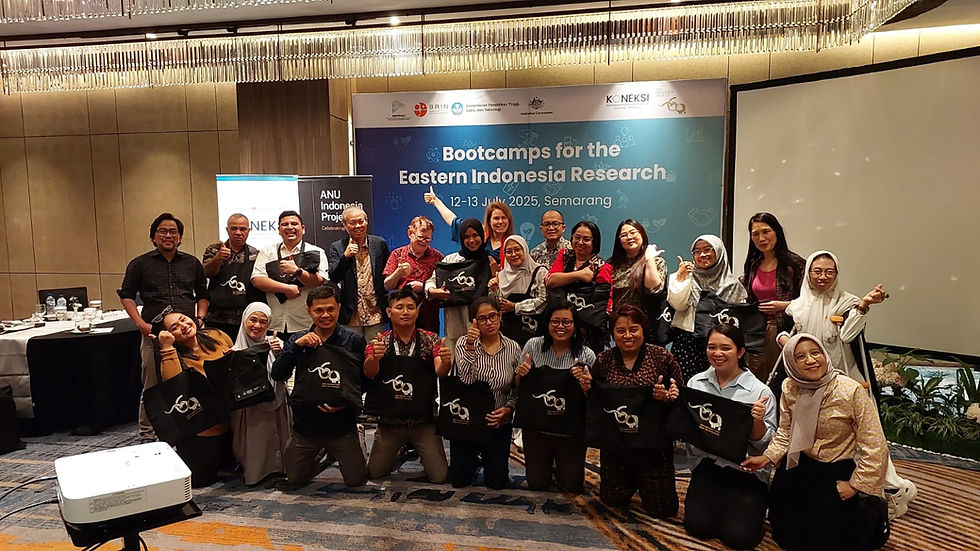KONEKSI Learning Visit: Collaboration SID, CSIRO, BRIN, and UNRAM Presents AI-Based Digital Health Innovation
- recruitment892
- Aug 15, 2025
- 3 min read

A KONEKSI visit to the Summit Institute for Development (SID) was successfully held on August 7–8, 2025. This KONEKSI Learning Visit aimed to gain an in-depth understanding of SID's research project, titled “Expanding agenda of digitizing integrated digital primary healthcare using AI deep learning neural networks to predict compliance behavior in a community and healthcare delivery performance.” The visit also served as a valuable opportunity to reflect on partnership dynamics, examine inclusive approaches, and explore how research is translated into real-world impact.


On the first day, August 7, 2025, the KONEKSI team engaged in an intensive discussion with consortium partners: the Summit Institute for Development (SID), Commonwealth Scientific and Industrial Research Organisation (CSIRO) from Australia, the National Research and Innovation Agency (BRIN), and Mataram University (UNRAM). This session focused on strengthening coordination and collaboration. The SID team provided the latest updates on project implementation, including progress, challenges, and strategies taken. The discussion also explored the potential for research findings uptake, identified key challenges, and formulated joint strategies. The day concluded with an introduction to SID's infrastructure and a briefing for the following day's field visit.
In detail, SID’s digital infrastructure includes:
Health Communication (WhatsApp API and Call Center): Enables fast and integrated communication between the project team and Posyandu (community health posts), Puskesmas (community health centers), and the community. The use of a WhatsApp API facilitates the automatic sending of information, reminders, and follow-ups, while the Call Center functions as a service hub to answer questions and provide direct support.
Dynamic Worker Support (DWS): Serves as the operational backbone, providing flexible support to health workers in the field. Through this platform, staff can receive real-time guidance, educational materials, and other support, which is crucial for program implementation in various locations.
FHIR (Fast Healthcare Interoperability Resources) Data Standard: SID adopts FHIR as a health data exchange standard to ensure data is well-structured, interoperable, and secure.



On the second day, August 8, 2025, the KONEKSI team conducted a field visit to Posyandu Tanak Beak Timur, Narmada. This visit provided a direct view of the project's implementation within the community. The team observed team-based care practices and the integration of digital tools (DWS, KuApss), including the use of AI, to improve maternal and child health services. This demonstrated how the research conducted by SID and its partners can be translated into tangible impact
The visit yielded several important lessons. First, the synergy between SID and its consortium partners is growing stronger, with effective practices supporting an equal and sustainable partnership. Second, approaches to gender, disability, and social inclusion will continue to be implemented in this project. Third, the visit clarified how research can be translated into significant impact at the Posyandu, Puskesmas, and local government levels. Fourth, the relationship between SID and policymakers needs to be maintained collaboratively and actively to build sustainable programs. Lastly, the initial use of AI to support frontline health workers shows great potential for improving the effectiveness of primary healthcare services.
Overall, this KONEKSI visit was a significant milestone in strengthening the shared commitment to producing high-quality and sustainable research. We hope this collaboration continues and paves the way for broader utilization, including in ongoing or planned Indonesia-Australia partnerships.
The testimonial from a representative of KONEKSI Partnership further reinforced the positive outcomes of this visit. Noviana Noor Aisyiah, Senior Partnership Coordinator at KONEKSI, shared her profound impressions, affirming that this research collaboration is not only technically solid but also aligned with the values of equal partnership, social inclusion, and the relevance of its impact on the community.
"We see that the research partnership is very strong and promising. The team has diverse backgrounds and expertise, making the collaboration highly multidisciplinary. We also appreciate how the principle of equality is applied, ensuring every individual has an equal contribution.
Furthermore, this project aligns with the GEDSI principles that we uphold, especially concerning gender and social inclusion. In terms of impact, the project is highly relevant. The efforts in digitalizing healthcare, particularly for maternal and child services, are crucial for addressing government priorities. We also see that the team has successfully built strong relationships at both the national and provincial levels.
Overall, we are very happy and impressed with what we have seen today. We hope the research continues to be successful. If there are challenges, we at KONEKSI are ready to provide support!"





Comments